
A webinar held by Al Jazeera Centre for Studies in collaboration with Al Jazeera Mubasher on Wednesday, 15 September 2021, presented the opportunities and challenges that Afghanistan represents to regional and international powers after the United States’ withdrawal. The panellists concluded that there are opportunities on the horizon but that it is too early to determine whether or not they will be realised if the situation in the country does not stabilise and whether the Taliban will be able to manage the country’s affairs or face turmoil and unrest, rendering Afghanistan a threat to its neighbours.
The panellists cited examples of what countries concerned with Afghanistan – especially Russia, China, Pakistan, Qatar, Turkey and Iran – could gain if the situation stabilises for the Taliban, particularly in terms of investment in infrastructure or rebuilding, capitalising on the country’s strategic location for transporting energy, or economy and trade.
The discussion also indicated that many of the aforementioned countries have fears and concerns due to the ambiguity of the future. Russia, for example, as stated by the Russian expert participating in the webinar, views Afghanistan from the perspective of the extent of its threat to the security of neighbouring countries, especially the Central Asian republics, and the impact of that on Moscow if Afghanistan becomes a “failed state,” causing an influx of migrants or becoming a haven for opposition or terrorist groups.
Similarly, Saudi Arabia, according to another panellist, fears that Afghanistan under the Taliban’s rule may become a hub for Arab, especially Saudi, Islamist extremists now that the kingdom has rerouted its direction since Mohammed bin Salman’s appointment as Crown Prince towards modernity. In this context, it was indicated that Riyadh was relying on Islamabad to improve its relations with the Taliban; and now, relations between the two countries have declined due to their positions towards the war in Yemen and Kashmir.
Pakistan, on the other hand, is at ease with what transpired in Afghanistan because the Taliban’s position towards Indian influence in their country is different from that of the regime that came with the US invasion. Nonetheless, Pakistan is still observing where matters could lead to in Afghanistan.
Qatar, however, has always had a prominent role in the Afghan portfolio, from hosting negotiations between the Taliban and the United States and facilitating the evacuation of those wishing to leave the country to reopening Kabul airport and establishing an air bridge for the transport of aid to the country. The discussion maintained that this role will continue based on Qatar’s vision, which was formed in the mid-1990s, that peace and stability in the countries of the region, both near and distant, impacts Qatar positively. Accordingly, Qatari endeavours will continue in order to make peace and stability in Afghanistan sustainable.
The webinar was entitled, “After US Withdrawal: International and Regional Calculations in Afghanistan,” and included Umer Karim, a researcher specialising in defence and military affairs and fellow at the Royal United Services Institute (RUSI); Nikolay Khozanov, expert on Middle East affairs and professor at Qatar University; Jaber al-Harmi, Qatari journalist and political analyst; Haoues Taguia, researcher at Al Jazeera Centre for Studies (AJCS) specialising in Arab affairs; and David Des Roches, associate professor at the Near East South Asia Center for Security Studies (NESA).
To watch the full webinar, click here.